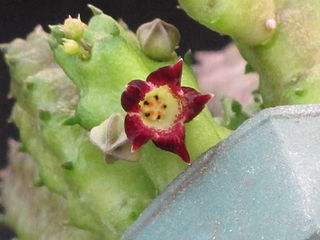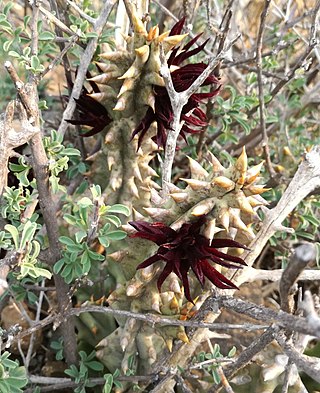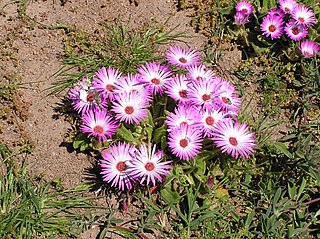
The Asclepiadoideae are a subfamily of plants in the family Apocynaceae. Formerly, they were treated as a separate family under the name Asclepiadaceae, e.g. by APG II, and known as the milkweed family.

The genus Huernia consists of perennial, stem succulents from Eastern and Southern Africa and Arabia, first described as a genus in 1810.
Sophia Theresa Williams-de Bruyn is a former South African anti-apartheid activist. She was the first recipient of the Women's Award for exceptional national service. She is the last living leader of the Women's March.
Australluma is a genus of plant in family Apocynaceae.

Baynesia is a genus of flowering plants in the family Apocynaceae. Its only species is Baynesia lophophora, endemic to Namibia. It was first discovered by Peter Bruyns in 1999, and first described by him in 2000.

Lavrania is a monospecific genus of plants in family Apocynaceae. Its only species is Lavrania haagnerae, endemic to Namibia. Its natural habitat is rocky areas.

The genus Quaqua falls within the tribe of plants known collectively as stapeliads. All stapeliads, including Quaqua, are Old World stem succulents.

Bartholomäus Bruyn (1493–1555), usually called Barthel Bruyn or Barthel Bruyn the Elder, was a German Renaissance painter active in Cologne. He painted altarpieces and portraits, and was Cologne's foremost portrait painter of his day.

Stapelianthus is a genus of flowering plants in the family Apocynaceae, first described as a genus in 1933. The entire genus is endemic to Madagascar and is concentrated in the far south of the island.

Fockea is a genus of succulent scrubs native to Africa south of the equator. They are members of the Asclepiadoideae (milkweeds), a subfamily of the dogbane family Apocynaceae. Of the six recognized species, only the two most widely distributed extend north of southern Africa, with F. multiflora reaching as far north as Tanzania and F. angustifolia reaching to southern Kenya. Fockea are known as water roots,, a reference to the bulbous caudex characteristic of most species, which is also edible in at least some species.

Pseudolithos is a genus of succulent flowering plants of the family Apocynaceae, indigenous to arid areas of Somalia, Yemen and Oman.

Orbea is a genus of flowering plants of the family Apocynaceae, first described as a genus in 1812. It is native to Africa and the Arabian Peninsula.
Portulacaria carrissoana is a shrubby succulent plant found on the border between Namibia and Angola.

Dorotheantheae is a small tribe of annual succulents in the Aizoaceae subfamily Ruschioideae. Though it originally comprised three genera, Cleretum remains as the only recognised genus. Dorotheantheae are endemic to the western and south-western parts of South Africa. The type genus is Dorotheanthus, despite it being no longer recognised.

Cleretum is a genus of flowering plants in the family Aizoaceae, native to the Cape Provinces of South Africa.
Apteranthes is a genus of flowering plants belonging to the family Apocynaceae.
Schizoglossum is a genus of flowering plants belonging to the family Apocynaceae.

Larryleachia perlata is a species of flowering plant the family Apocynaceae. The species is a succulent plant species. The species is considered an insufficiently known species.











